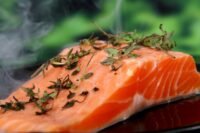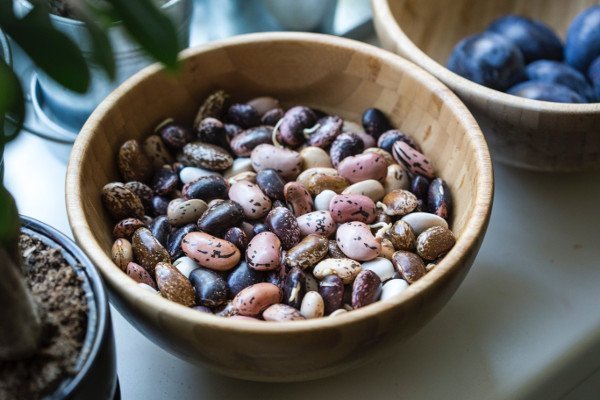
A properly executed science-based Mediterranean Diet, which can be low-carb, is typically omnivore-leaning with a heavy vegetarian or vegan focus. Extensive scientific research has confirmed that centenarians — human beings who live to be 100 years or older — typically eat a vegetarian/vegan-heavy omnivore diet rich in clean, whole foods (there are no documented centenarian cases that involve the carnivore diet). Proper daily amounts of high-quality macronutrients — protein, fat, water, and carbohydrates/carbs (especially fiber) — as well as micronutrients including vitamins, minerals, and antioxidants, are key.
The scientific standard for health and longevity is understanding how centenarian human beings live such a long life. Diet is a cornerstone of such understanding, along with unique genetics/body composition, metabolism, exercise, and lifestyle (sleep, stress, etc.).
Mediterranean Diet (Including Low Carb Versions) – Ingredients/Nutrition Including Vitamins, Minerals, Antioxidants, Protein, Fiber, Carbs, Fats/Oils, Spices, Hydration
Involving a diverse array of up to 95% (for some, more) high-fiber, healthy, plant-based foods, the Mediterranean Diet, which can be low carb (typically 37 to 150 grams of carbs), takes advantage of clean, whole-food nutritional ingredients. Popular dishes incorporate properly processed and cooked, vitamin-and-mineral-infused, nutrient-rich vegetables. Veggies like  spinach, kale, and other leafy greens, peas, cauliflower, squash, beets, turnips, chard, collard greens, broccoli, tomatoes, potatoes, peppers, radish, avocado, carrots, garlic, onions, cucumber, sweet potatoes (yams), and the like. Adding to the cornucopia are vitamin, mineral, and antioxidant-rich mixed fruits. Blueberry, lemons, limes, papayas, pineapples, bananas, strawberry, oranges, raspberry, blackberry, cherry, apples, peaches, pears, coconut, and such are common.
spinach, kale, and other leafy greens, peas, cauliflower, squash, beets, turnips, chard, collard greens, broccoli, tomatoes, potatoes, peppers, radish, avocado, carrots, garlic, onions, cucumber, sweet potatoes (yams), and the like. Adding to the cornucopia are vitamin, mineral, and antioxidant-rich mixed fruits. Blueberry, lemons, limes, papayas, pineapples, bananas, strawberry, oranges, raspberry, blackberry, cherry, apples, peaches, pears, coconut, and such are common.
Commonplace spices and herbs include basil, turmeric, paprika, bay leaves, red pepper, sea salt, pepper, etc. Whole flaxseed (fiber) is a solid Omega 3 fatty acid choice, containing alpha-linolenic acid (ALA) and DHA/EPA.
Good fats/oils are anti-inflammatory, reduce cholesterol, contain vital nutrients & antioxidants, and help maintain overall long-term health. Extra virgin olive oil (cold-pressed) is a staple Omega 6 and 9 monounsaturated and polyunsaturated fat. Extra virgin avocado oil is an especially good saturated fat for high heat (sparingly) cooking/baking.
Refined sugar carbs, starch carbs, and artificial sweeteners are almost non-existent. Keep sugar to no more than 24 grams (6 teaspoons) for women and 36 grams (9 teaspoons) for men of added sugar daily. The best choices are whole fruit, and in moderation high-quality honey, blackstrap molasses, or more rarely, raw, whole sugar. Avoid fast, junk, and processed foods, as well as any product that lists sugar among its first five ingredients. Bread (carbs) is typically sourdough or 100% whole-grain wheat, rye, or barley.
Mediterranean Diet Protein Sources
Protein is derived from different legumes/beans, lentils, chickpeas (garbanzo), black-eyed peas, fava beans, soybeans (tofu/traditional & tempeh/natto/fermented), quinoa, oats, barley, whole grains, nuts like almonds, cashews, walnuts, pistachios,  Brazil nuts, etc. and seeds. People who stick to the Mediterranean Diet, including low-carb versions, typically eat lean meat (red meat, poultry/chicken/turkey, pork), although in reduced amounts relative to the “normal” standard American/Western diet (SAD).
Brazil nuts, etc. and seeds. People who stick to the Mediterranean Diet, including low-carb versions, typically eat lean meat (red meat, poultry/chicken/turkey, pork), although in reduced amounts relative to the “normal” standard American/Western diet (SAD).
Middle-of-the-food-chain fish species like salmon (especially deep water Pacific), sardines, anchovies, cod, and trout, all of which have omega 3 docosahexaenoic acid/DHA & eicosapentaenoic acid/EPA  fatty acids, are common. These species typically are not exposed to high levels of mercury or other harmful chemicals and are usual choices for seafood and fish.
fatty acids, are common. These species typically are not exposed to high levels of mercury or other harmful chemicals and are usual choices for seafood and fish.
Eggs and dairy are consumed, but not in the same quantities as the Standard American Diet (SAD). Cows milk is much less consumed in favor of goat and sheep products. Fermented products are popular, like yogurt and kefir, to assist with positive/good bacteria/gut flora, intestinal health, and immunity. People sensitive to dairy will need to be especially aware of their daily calcium needs, at least.
Staying Hydrated
People who follow the Mediterranean Diet regularly drink lots of clean water to avoid dehydration (and slower metabolism, no less). They also consume coffee, tea (particularly green & black), kombucha, and wine, particularly red. Alcohol, like with most everything regarding any healthy diet, is ingested in moderation (and the very latest scientific research shows that alcohol moderation is likely no alcohol at all, except maybe on rare special occasions in small amounts only).
Mediterranean Diet, Moderation
Overeating is frowned upon. Many centenarian people live by the 80% full rule, also called hara hachi bu (Confucian teaching). The general idea is to stop eating when you feel 80% full. Of course, consistent, daily exercise (cardio and resistance/weightlifting/isometrics) and  balanced lifestyle choices (proper sleep, relationships/socializing, emotional health, spirituality/soul searching, etc.) are also vital to help keep stress and unbalance to a minimum.
balanced lifestyle choices (proper sleep, relationships/socializing, emotional health, spirituality/soul searching, etc.) are also vital to help keep stress and unbalance to a minimum.
Moderation to maintain minimal stress also includes hobbies. Gardening and being out in nature are two common activities. Finding a healthy hobby can help one’s body and mind stay active and engaged.
For most people, successfully implementing and living the Mediterranean Diet, which can be low carb, means using food as medicine leading to a reduced need to deal with and manage obesity (childhood and adult) and excessive weight loss and gain, no less. As well, it increases the likelihood of efficient and effective organ (heart, liver, kidneys, etc.) functioning and overall health. Genes/genetics inherently play a strong role in things, but the holistic balanced nature of the diet allows for maintaining optimal weight through a healthy, consistent metabolism & bacterial gut health (immunity), at least.
Low Carb
A proper low-carb diet — 37 to 150 or so grams of fiber-focused carbs — encourages and fosters moderation, helping keep stress and disease (obesity, diabetes, heart disease, cancer, arthritis, etc. and possibly even Coronavirus/COVID-19) in check while improving insulin sensitivity, metabolism, Immunity, sleep, and mental health, no less. This allows the human body to function at optimally balanced levels for the short and long terms.
Furthermore, the scientifically-approved Mediterranean Diet can offer various low-carb diet versions, including low-fat, keto, Atkins, and Glycemic Index (GI) chart options, adding to its diversity and overall flexibility. For sustainable, successful acute regular white/yellow fat weight loss, the bullseye is 37 grams of clean, whole food including fiber-focused carbs.
Mediterranean Diet & Body Type

However, physical health and body type matter. More to the point, posture (vertebrae/spinal extension), muscles/muscle mass, and any lack of development thereof. Which of The Four Body Types (genetic scientific body type) you are will further affect variables like skinny fat including normal weight obesity, thin fat, cellulite, crepey skin, and loose/saggy skin.
Skinny fat will also directly affect BMI and metabolism (BMR) — and to at least some degree aging — as well as how you experience the obesity weight loss and gain roller coaster ride, disease, stress, inflammation, immunity (including positive bacteria/gut microbiome health), enteric brain/second brain (gut feeling), affordable healthcare, and your health as a whole.
On a side note: Extra Virgin Coconut Oil (medium-chain triglyceride, MCT — possible internal health benefits — and saturated fat) – An effective external moisturizer for skin, hair, and nails. Using a small amount, gently massage directly into skin and nails. For dry and/or frizzy hair, apply a small amount to the hair shaft and leave in for desired time (a few minutes to overnight), then wash out. Extra Virgin Coconut Oil is great to add to your skin, hair, and nail care routine.








Comment #606
Excellent site you have here but I was wanting to know if you knew
of any forums that cover the same topics discussed in this article?
I'd really like to be a part of online community where I can get advice from other knowledgeable individuals that share the same interest.
If you have any recommendations, please let me know. Thank you!
Comment #609
Hello Cassie:
This forum is the only one I am aware of...
What questions do you have?